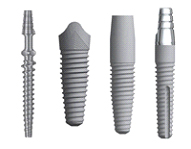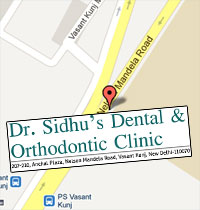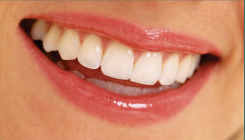Dental Implants: Consultation, Procedure, Recovery and Aftercare
Dental implants are artificial tooth replacements used to replace a missing tooth or teeth, helping to stop or prevent jaw bone loss. The dental implant procedure is categorized as a form of prosthetic (artificial replacement) dentistry.
Thus by replacing missing tooth , implants offer more than an esthetic enhancement, providing people with the strength and durability required to eat all the foods they love, without struggling to chew. Although you have a number of restorative options for the treatment of missing teeth, none have proven to be as functionally effective and durable as implants.
In many cases, dental implants may be the only logical choice for the restoration of all necessary functionality of the teeth and supporting structures.
Tooth Loss
 Teeth are lost because of:
Teeth are lost because of:
- Root canal failure.
- Trauma to the mouth.
- Excessive wear and tear.
- Congenital defects.
- Advanced Gum Disease.
- Destructive Caries.
People who have lost teeth might feel too self-conscious to smile or talk. Additionally, biting irregularities caused by tooth loss can have a negative effect on eating habits and this can lead to secondary health problems like malnutrition. Regardless of the nature of problems related to tooth loss, dental implants may provide a simple remedy with proven results.
Dental Implants Consultation and Treatment Planning
To determine if implants are right for you, a consultation with your dental surgeon is needed. During this appointment, your dental professional will conduct a thorough examination of your teeth and gums. This may involve a combination of X-rays and computer tomography scans (CBCT scans) . The scans allows the dental surgeon to determine the quality of bone and also whether sufficient bone exists for implant placement or not. The CBCT scan also allows to determine the exact location the implant should be placed.
Based on the condition of your oral tissues, oral hygiene and personal habits, and your commitment to follow your dentist's aftercare instructions, your dentist will advise you of your most appropriate dental implant treatment plan. Some patients with insufficient bone or gum tissue require bone or soft tissue grafts, and/or the use of small diameter implants.
Your treatment plan could involve the immediate placement of an implant and restoration at the same appointment, or require separate procedures to place the implant, allow healing and then place the restoration. In some instances, a series of procedures may be required to place tissue and bone grafting materials, allow time for healing, place the implant and allow it to integrate with your bone, and then place the restoration. Depending on your situation, your dental professional will advise you of how long the entire treatment process will take, how many appointments will be necessary and what you can expect after each procedure.
The consultation also will include discussion of options for local anesthesia (to numb the affected and surrounding areas) and sedation dentistry, if necessary.
Dental Implants Recovery and Aftercare
Dental implant recovery depends on a number of factors, including the various procedures required to complete your treatment. However, it is generally recognized that once an implant has been placed, maintaining diligent oral hygiene habits is required to ensure proper fusing of the implant and bone structure. Failure to floss and brush is a leading cause of implant failure, and infection can occur if the implant and surrounding areas are not cleaned properly. Smoking also is attributed to high failure rates with dental implants and should be avoided following implant procedures.
When dental implants are used to support crown restorations (like individual teeth), the entire treatment procedure may take anything from three to five months to complete.
Again, this timeframe depends on individual cases and treatments. Follow-up appointments with your treatment coordinators are essential for monitoring your progress. Additionally, even after the abutment and crown, bridge or implant-supported denture have been placed, routine follow-up appointments and cleanings still are required with your dentist and hygienist to ensure the longevity of your treatment.
If cared for properly, an implant restoration can remain in place for more many years. It is generally recognized that once an implant has been placed, maintaining diligent oral hygiene habits is required to ensure proper fusing of the implant and bone structure. Failure to floss and brush is a leading cause of implant failure, and infection can occur if the implant and surrounding areas are not cleaned
Implant Surgery Follow-up Care
After the initial surgical procedure, discomfort should be minimal. Swelling of your gums and face may occur, as well as minor bleeding and bruising of the implant site. Prescription pain medications may be prescribed by your dentist to relieve any pain or discomfort you feel after the procedure.
For five to seven days after surgery, your diet should be restricted to soft foods. If stitches are present, they may need to be removed by your dentist. If provisional restorations were placed along with the dental implant, it will be important to clean them as you would your natural teeth to ensure the best possible healing and fusing of the implant.
If provisional restorations were placed along with the dental implant, it will be important to clean them as you would your natural teeth to ensure the best possible healing and fusing of the implant.











